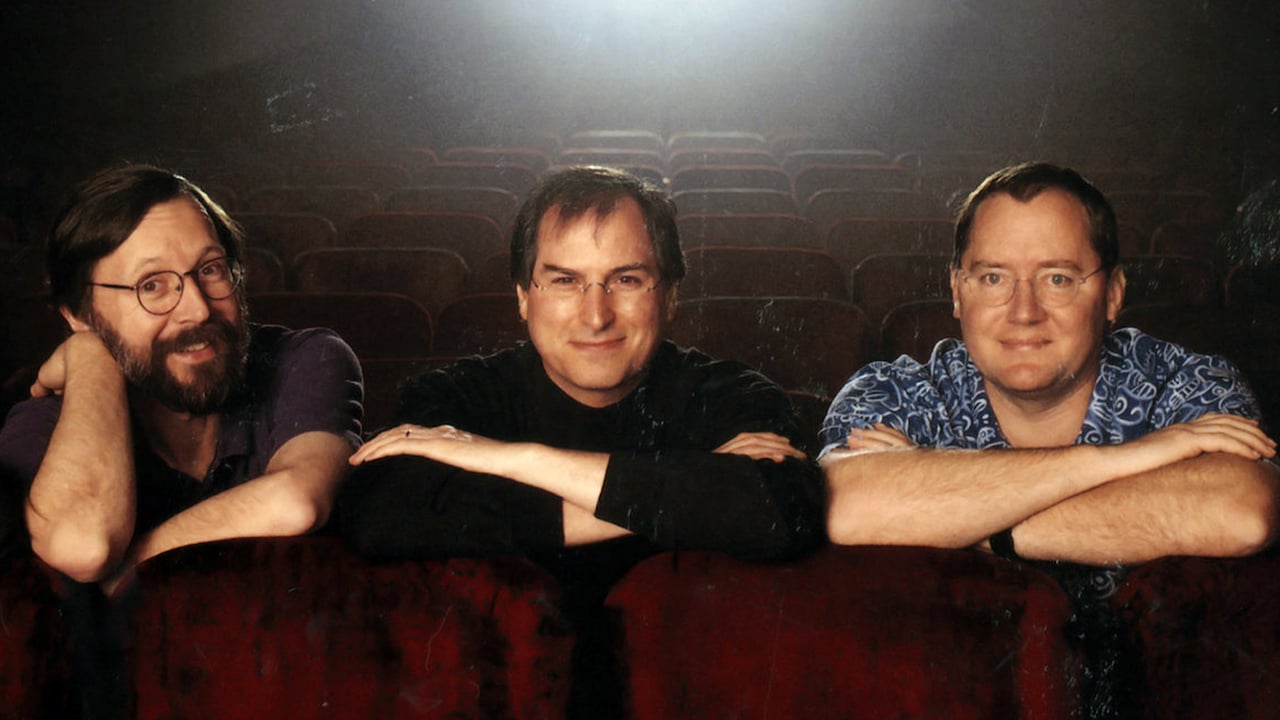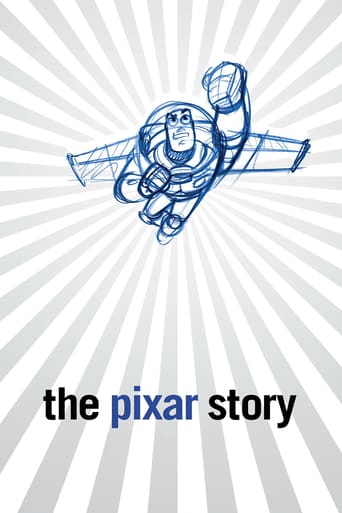

the audience applauded
... View MoreAs somebody who had not heard any of this before, it became a curious phenomenon to sit and watch a film and slowly have the realities begin to click into place.
... View MoreThe first must-see film of the year.
... View MoreClose shines in drama with strong language, adult themes.
... View MoreMy review of The Pixar Story allows me to release a theory on the studio's film Toy Story I vaguely established several months back and only came to fully formulate upon watching the documentary. The film details how Pixar was so advanced, innovative, and intimidating to several graphic designers and the animation industry in general, it was somewhat ostracized and manipulated by Disney because they had no idea just what to do with them. Sort of like how in Toy Story, Buzz Lightyear is sort of brushed off and mocked by Woody and several other toys upon his arrival. However, by the end, the toys all learn to work together in unison for the greater good of...the toybox, perhaps? If you allow Buzz Lightyear to represent Pixar, Woody as Disney, and the additional toys as other animated studios and computer designers, the film is sort of allegorical in the regard to the rise of Pixar. Whether this is intentional or not is up for serious debate. I think it was just my brain overworking itself after a long line of average movies.On the other hand, the documentary The Pixar Story is, like the studio, something to behold. It's a necessary and efficient profile of one of the best and most powerful studios today, and sheds light on the innovators creating the films loved by kids and adults alike. It begins by showing us three men that drove the forces of Pixar as we know it. They are Ed Catmull, a technical officer, Steve Jobs, the late entrepreneur and CEO of Apple, and John Lasseter, Pixar's founding father. We learn that Lasseter was into animation from just a little kid, and relished the thought that he could grow up to make cartoons for a living.He attended California Institute of the Arts, where he won back-to-back Student Academy Awards for two short films he made while in school. When he finally got a job at Disney, he spent a lengthy time developing ideas for intriguing and innovative cartoons before he was fired because Disney, ultimately, didn't know what to do with such an ambitious soul. He was trying to introduce the wonders of computer animation to the company in the mid 1980's, when the machine was already being feared as a substitute for man. Lasseter tried to implore, however, that the computer is a tool for the artist and that it's inherently incapable of creative thinking. That's where an artist comes in.Catmull who assisted a lot with the technical side of Lasster's animation and even is credited with creating the first computer animated scene in film history in the 1976 film FutureWorld, while Jobs invested and believed so much in Lasseter's vision he was able to take several financial beatings before even returning any money, leading him to be called the world's most forgiving venture capitalist. In a sense, these men were rebels without a utensil. They believed in a new way to create art enough to further it and churn out film after film, each one a financial and critical success.After establishing the three men, the film looks extensively at the production of Toy Story. Lasseter claims that making this the studio's first feature was an intelligent decision because he stated early on he did not want to follow in the footsteps of Disney by creating frothy musicals and mythical fairy-tales. Through numerous uphill battles, the film was made and received universal rave reviews. The animation was dazzling, the storyline clicked with young kids and the adults, who didn't see the film as one to endure but one to enjoy, and the immensity of the animated setting and the gravity-defying ways the characters were moving was simply remarkable and never-before-seen. The film also details how the film's release sparked questions about the future of computer animated features and whether or not they would be the future and hand-drawn/traditional animation would later be phased out with the times. The Pixar staff in the film make perfectly clear that time between Toy Story and A Bug's Life, their followup film, was nervewracking because they had to prove that they were the real deal and people weren't just overhyping their work.On a final note, the latter act of the film concerns the traditional vs. computer animation debate and how after Disney films began to take a loss in revenue, the medium of traditional animation was rejected in favor of its sleeker, more visually dazzling cousin. In my opinion, the two could've coexisted and the demise was the fault of studios like Disney and DreamWorks not updating their stories and not their technology. Pixar raised the bar in animation, but it did the same in storytelling too, and American audiences didn't care to see a film like Disney's Home on the Range, Jungle Book 2, or Teacher's Pet when their sister-studio Pixar was churning out films like Finding Nemo, Monsters, Inc., and Toy Story 2 during the exact same time. Pixar's magical quality stemmed from them allowing the stereotype of animated films being for kids to gradually disappear and get adults, teenagers, and the elderly excited for their latest endeavor. The bar was raised in both departments, and Disney should've realized that films about singing cows and singing jungle animals weren't going to cut it any longer. The demise of the animation the studio pioneered was its own fault - not Pixar, who unfortunately was handed much of the blame.The Pixar Story is a solid documentary exploring a profound, revolutionary studio, and, in addition to it taking a look at each individual Pixar film (we can try and forgive the huge amount of time the film spends developing Toy Story and how the remaining six features get the cold shoulder in terms of how much time they're allotted on screen) explores a medium that definitely deserves a documentary in its honor.
... View MoreLike almost every child of my generation, I grew up on Pixar and in particular Toy Story. Some of my fondest and most memorable cinematic memories were going to see Monsters Inc, Finding Nemo and The Incredibles (where afterwards I thought "I can't wait for the sequel"). I remember that one of my first dream jobs in film was to write stories for Pixar and explore all the imaginative possibilities. Now that I've gotten more into film, I've gained a deeper respect for their storytelling and their technology and how hard it is. The Pixar Story tracks the origin of Pixar from when John Lasseter was first inspired to pursue animation to around 2007, before Ratatouille hit the screens. It's an informative look into how the company came to be and of all the struggles. It's very interesting as I would like to get into the industry as well. The biggest chunk is the struggle to create Toy Story - not just to get it commissioned but also to find the story. This is also a trouble with Monsters Inc. where they had the concept but almost too many possibilities to explore. Narrowing down those possibilities is a incredibly difficult job and is something I'm aspiring to achieve at this very moment so it was especially fascinating to watch.It's always great fun to have a look into their offices with their scooters and arcades. However, perhaps this documentary has come too soon, they talk about fears of being too factory-line, setting a standard they can no longer top and as this comes before one of their most successful strands of films with Wall-E, Up (a film that I didn't like at first but it's grown on me) and Toy Story 3 and then perhaps the beginning of a very boring strand with Cars 2, Brave and Monsters University, I want to know whether they think they're topping themselves or have sunken into a comfort zone. A short reflection on their fears would be very interesting. The doc focuses on the followup chaos after the Toy Story section, with second project syndrome lingering over the Pixar team. A Bug's Life was considered a success at the time and although in hindsight, many disagree, the documentary put me in the mood to rewatch and while the first act is perhaps a bit too childish, it grows and grows and is exceptional storytelling in the end. I hope Pixar haven't peaked with the closure of Toy Story 3 and they can continue making films that get to me. The documentary also makes great use of graphics and animation which is pretty appropriate for this topic. Very entertaining and informative.8/10
... View Moreit is a great True Story it is a movie for everyone to enjoy it is just a perfect Pixar movie i think you will enjoy this wonderful movie that will warm your hart but it should of been a 3D movie that should of been in IMAX 3D now that would of been a cool movie but it was still a cool and sweet movie that is a great movie for everyone i really hope you enjoy this masterpiece of a film that should be back out in theaters on the big screen in IMAX 3D it is a must see film i hope you enjoy this classic i never saw a movie this good before in my life i hope you like it as much as i do it is wonderful family hit this movie is a smash hit for sure i never saw anything like this ever i hope you enjoy i like this movie so much that i want it to come back out of the Disney volt for i can get it that is how much i liked this wonderful movie that is OK for everyone this is like the biggest movie of all times i like this movie a lot and i hope you enjoy this wonderful movie as much as i do i never watched a movie like this in my whole life hope you enjoy everyone
... View MoreJasper102011 here to review The pixar story.Pixar is the company with a luxo lamp as a mascot and a cabinet full of academy rewards.This film shows that great movies and great story's can go through pain and hard work and even one of the best film company's can go through that.The man himself john lasseter has the idea for computer-animation or CGI but Disney dumps it with john stuck at lucasfilms and make very famous short films. A hard-core pixarfan would stare at the screen watching every step of the way because I am one and one word would move the story onwards.The pixar story is a overall brilliant documentary, the movie tells that its not the technology that makes the movies great, but its the people who make it.I really like the film with its interviews with famous Disney animators and tells you when pixar had a problem, it tells you how they solved it.i wish pixar make a sequel for the more modern movies.If your a really big fan or you just heard of pixar i highly recommend it so grab some popcorn and enjoy!
... View More